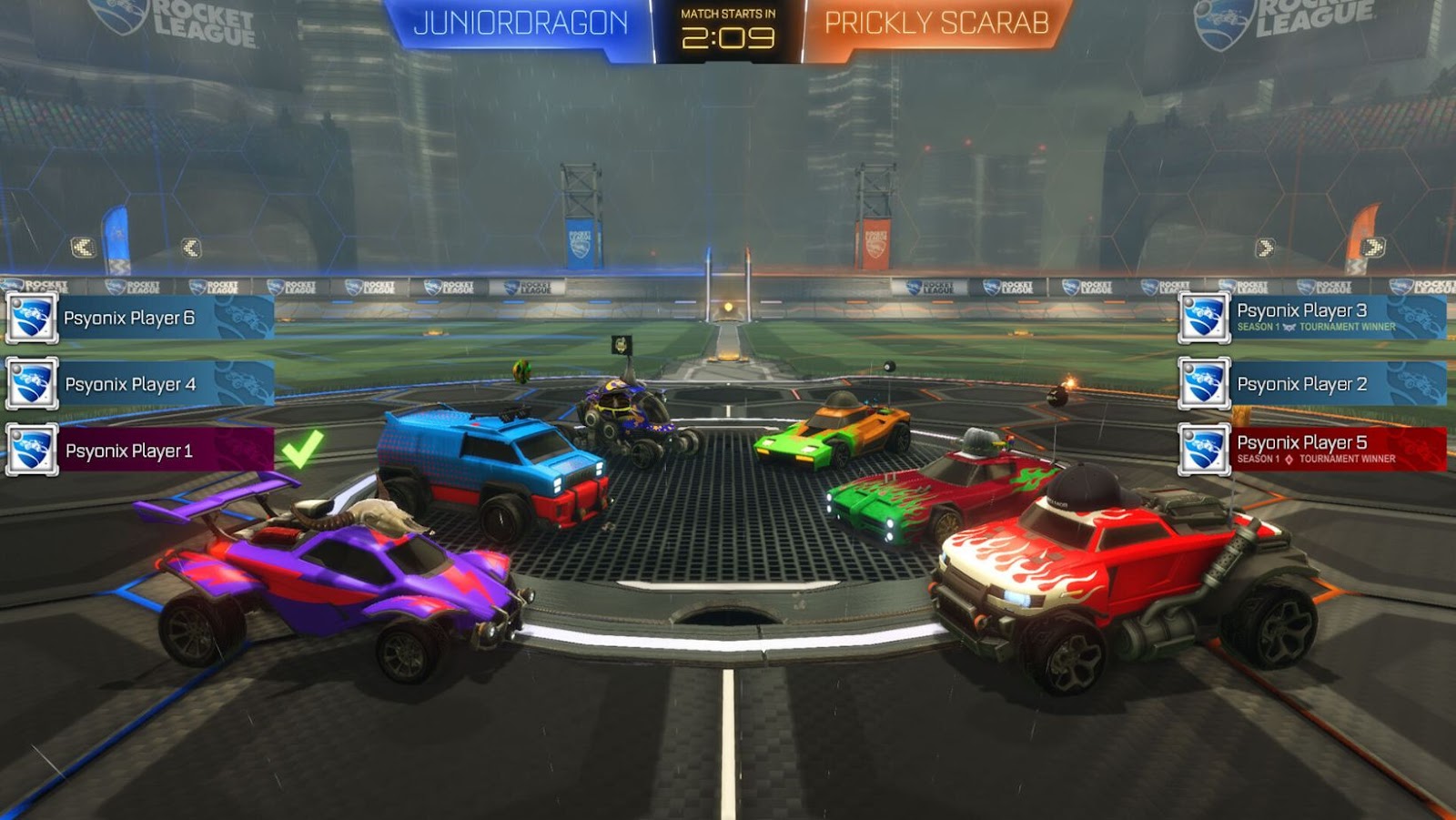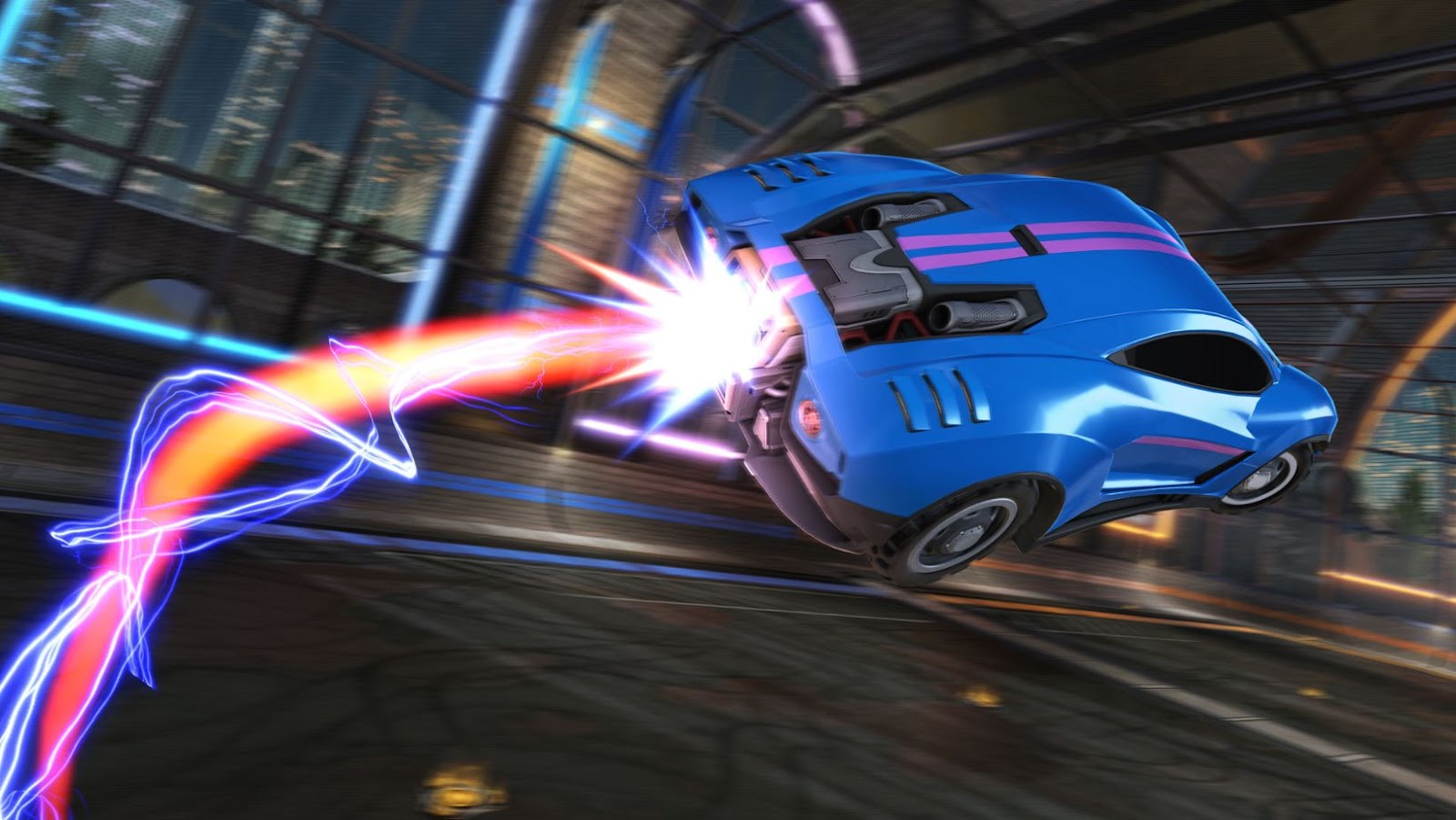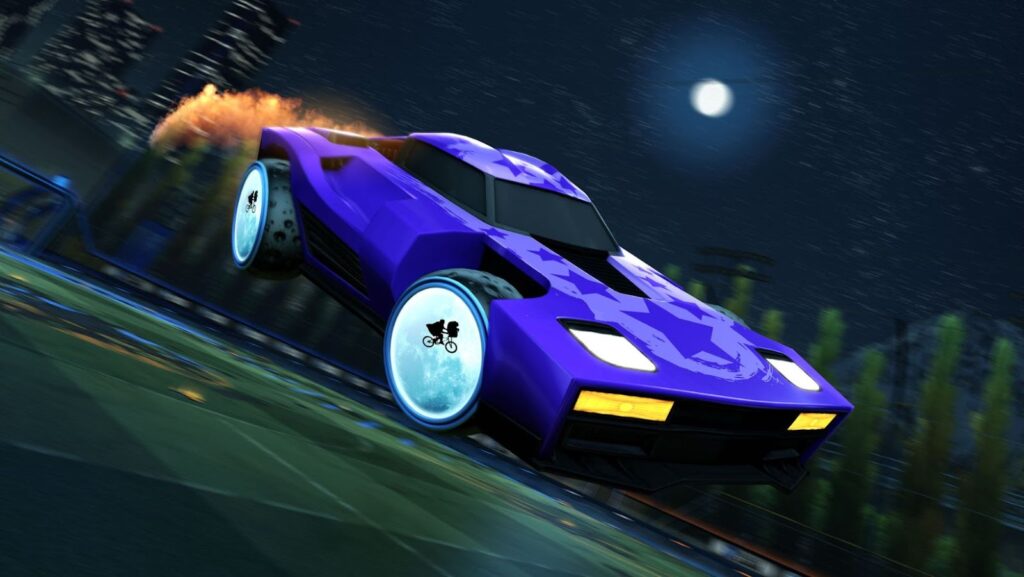Rocket League, the high-flying, rocket-powered car soccer game, was first released in July 2015 for PlayStation 4 and PC. Since then, the game has undergone several updates, and its popularity has skyrocketed. In its first year, Rocket League was praised for its unique concept, fast-paced gameplay, and tight controls. It quickly gained a following, with players around the world competing in online multiplayer matches and local tournaments. As the game evolved, new features were added, including basketball and ice hockey modes, a variety of customization options, and cross-platform play. These updates kept the game fresh and engaging for players, leading to a massive surge in popularity in 2020.
Today, Rocket League boasts a vast community of fans and professional players, and its unique combination of sports and vehicular action has cemented its place in gaming history.
Table of Contents
ToggleOrigins of Rocket League
Rocket League is a vehicular soccer video game developed and published by Psyonix. It was first released in July 2015 for Microsoft Windows and PlayStation 4 platforms. Since then, the game has gone through many updates and enhancements, which have revolutionised its gameplay and made it more popular among gamers. Let’s take a look at the history of Rocket League and how it has evolved since its initial release.
Supersonic Acrobatic Rocket-Powered Battle-Cars (SARPBC)
Supersonic Acrobatic Rocket-Powered Battle-Cars (SARPBC) is a 2008 vehicular soccer game that inspired the development of Rocket League.
After SARPBC failed to gain widespread recognition, Psyonix, the developers, decided to revamp the game and released Rocket League in 2015.
Rocket League introduced several game-changing features like improved graphics, physics-based gameplay, and multiplayer modes. Players could now choose different vehicles with unique abilities and compete in intense matches to score goals.
The game was an instant hit, with over 10 million copies sold and several awards to its name. Rocket League continues to evolve with regular updates, new cars, and new game modes.
Development of Rocket League
Rocket League is a popular online multiplayer video game, developed by Psyonix, that combines soccer and car-racing elements to create a unique experience for gamers worldwide. The origins of Rocket League date back to 2008 when Psyonix was working on a game called Supersonic Acrobatic Rocket-Powered Battle-Cars, a less popular predecessor to Rocket League. The game was initially released in 2015 for PlayStation 4 and PC, with later versions available for Xbox One and Nintendo Switch. Since then, the game has evolved significantly, adding new modes, features, and cars with every update. The game’s success can be attributed to its simple gameplay mechanics, competitive nature, and cross-platform availability. In recent years, it has become a staple of the esports scene, with Psyonix hosting numerous tournaments and leagues, offering massive prize pools to participating teams. The game’s future also looks bright, with Psyonix announcing a brand new season, new features, and game modes to be added soon, giving gamers a lot to be excited about.
With a strong community and active developer support, Rocket League seems poised to continue its successful evolution in the coming years.

Rocket League’s Early Years
Rocket League is a vehicular soccer video game developed and published by Psyonix. The game was first released in 2015, and instantly became a massive hit due to its unique combination of racing and soccer gaming elements.
Let’s take a look back at the game’s early years, and how it has evolved since its release, particularly when it went free to play.
Launch And Initial Reception
Rocket League was launched in July 2015 on the PlayStation 4 and Microsoft Windows platforms. The game immediately garnered positive reviews and praise for its unique blend of soccer and vehicular gameplay. Rocket League’s initial reception was overwhelmingly positive, with critics and gamers alike praising its addictive gameplay, exhilarating matches, and excellent multiplayer features. Rocket League’s developers, Psyonix, continued to support the game with free content updates, introducing new stadiums, game modes, and customization options, keeping the game fresh and engaging. The game’s success led to its expansion on other platforms, including Xbox One and the Nintendo Switch. Since its release, Rocket League has become a favourite among the gaming community, and its competitive Esports scene has grown exponentially, with millions of players and fans worldwide. The game’s continuous evolution has kept fans engaged and intrigued, establishing Rocket League as one of the most popular and innovative games of recent times.
Competitive Scene Emerges
Rocket League has evolved significantly in its competitive scene since its release, producing a diverse and vibrant community of professional players, teams, and tournaments. In the early years of Rocket League, the competitive scene was less advanced, with only a few community-driven tournaments and no official support from the game’s developers, Psyonix. However, as the player base grew, so did the competitive scene, with more and more players seeking to showcase their skills and compete with one another. Psyonix responded to this demand by introducing a competitive game mode in 2016, complete with ranking systems, leaderboards, and seasonal rewards. This official support has enabled Rocket League to become a staple in the esports world, with numerous professional leagues and tournaments, including the Rocket League Championship Series. The competitive scene has also produced numerous high-level players, each with their unique play styles, strategies, and personalities, contributing to the game’s continued growth and popularity. The evolution of Rocket League’s competitive scene is a testament to the enduring appeal of the game and the passion of its players and fans.
Impact on Esports
The impact of Rocket League on esports has been tremendous since its release in 2015. This high-energy, fast-paced game quickly gained a following and became a popular esports title worldwide. Rocket League’s easy-to-learn gameplay, flashy graphics, and high skill-ceiling attracted gamers and non-gamers alike to the competitive scene. Top-tier players began emerging and competing in tournaments with significant prize pools. As a result, Rocket League became an esports powerhouse, with thousands of players competing in a variety of tournaments all around the world. Rocket League’s high-speed action and addictive gameplay have made it an esports fan-favourite and attracted a new generation of gamers to the scene.
Changes in Rocket League
Since its release in 2015, Rocket League has gone through many drastic changes. From the introduction of new maps, game modes, and even the opening of Rocket League to Free-to-Play users, the game has changed significantly over the years. This article will look at when Rocket League went free-to-play and other changes it has gone through.
Psyonix Acquisition by Epic Games
In May 2019, Epic Games acquired Psyonix, the developer of Rocket League, bringing about significant changes to the popular competitive soccer game. Since its release in 2015, Rocket League has evolved from a simple game with limited modes into a complex and intricate game with several modes, cars, arenas, and customization options. The acquisition by Epic Games has brought about several changes to Rocket League, including a shift from a paid game to a free-to-play game, the addition of cross-platform play, and countless new customization options. Despite the changes, Rocket League has remained true to its roots, offering intense and entertaining gameplay that has made it one of the most beloved and popular games in the world.

Free-to-Play Launch And its Impact
The free-to-play launch of Rocket League has had a significant impact on the game and its community, bringing in new players, changing the in-game economy, and shifting the focus of the game’s updates. Since its release in 2015, Rocket League has undergone numerous changes and updates, including the addition of new game modes, arenas, and cosmetic items. However, the free-to-play launch in 2020 marked a significant turning point for the game. With an influx of new players, the game’s matchmaking and ranking systems were overhauled to improve the overall player experience. Additionally, the in-game economy shifted with the introduction of credits as the new form of currency, replacing the previous keys system.
The game’s updates and content releases now focus on a seasonal model, with new items and challenges added every few months, keeping the game fresh and engaging for both old and new players alike.
New Modes And Features
Since the release of Rocket League, the game has taken on various modes and features that have evolved the game and kept it exciting for its players. Here are some of the new modes and features implemented over the years:
Hoops: This mode was added in 2016 and allowed players to play basketball-themed games with their rocket-powered cars.
Rumble: This mode allows players to activate random items and power-ups during matches, adding a unique twist to gameplay.
Dropshot: This mode was introduced in 2017 and allows players to break their opponent’s floor to score points.
Tournaments: This feature allows players to create and join tournaments with their friends.
Cross-Platform Play: In 2019, cross-platform play was implemented to allow players to matchmake and play with friends on different gaming consoles.
These modes and features have made Rocket League more diverse and exciting, keeping the game fresh after years since its release.
Rocket League’s Future
Rocket League has been one of the most popular games since its release in 2015. It’s been praised for its vibrant visuals and engaging gameplay. Recently, the game went free to play and since then, the game has seen a huge boost in popularity.
In this article, we’ll look at the game’s history and the changes it has gone through since its release, as well as looking at what the future could hold for Rocket League.
Updates And Upcoming Content
Rocket League is a game that has evolved significantly since its release in 2015. With regular updates, it has continued to capture the imagination of fans of vehicular soccer.
The game developers, Psyonix, have consistently released updates to Rocket League, each bringing a new experience to players. The upcoming content to look out for includes new features, seasons, and game modes. The updates have ensured the game has remained fresh and popular even after all these years.
In addition to the new game updates, players can also expect more information and history about the game itself. The history of Rocket League goes beyond its launch in 2015: the early years of development, the original concept, and the backstories of its creators. Knowing where things began and how far the game has come can help players understand and appreciate the game even more.
Overall, the updates and upcoming content provide an exciting future for Rocket League and its players.
Continued Growth in Esports
Esports has seen a remarkable rise in popularity in recent years and it shows no signs of slowing down. With an estimated audience of over 450 million people and revenues projected to reach $1.1 billion by 2020, esports is quickly becoming a major player in the entertainment industry. Rocket League, a popular vehicular soccer game, has been at the forefront of this growth since its release in 2015. With over 10 million copies sold and a dedicated community of players and fans, Rocket League has continued to evolve and improve with regular updates and new content. From new game modes and features to updated graphics and physics engines, Rocket League has come a long way since its early days. But its core gameplay, which involves driving cars and using them to hit a ball into a goal, has remained the same and has helped to build a dedicated and passionate fanbase.
As esports continues to grow, Rocket League is set to be a major player in the industry, with its unique blend of sports and gaming attracting players and fans from all over the world.
Anticipation For Rocket League 2
As of now, there is no official announcement regarding “Rocket League 2”, but the enthusiasm among the fans is sky-high, and they are eagerly anticipating the release of the game.
Meanwhile, let us take a look at the evolutionary journey of the game since its release in 2015. Initially, the game’s simple yet unique concept of cars playing football struck a chord with the players, compelling them to play over and over again. Psyonix, the game’s developers, kept on updating the game with new modes, better graphics, and music to ensure that its audience remained engaged. The game introduced new maps and modes such as the Rumble Mode, the Dropshot Mode, and the Hoops Mode.
The popularity of the game skyrocketed, and it gained millions of players throughout the years. The game also found a place in competitive gaming, with Psyonix organising the Rocket League Championship Series every year.
In conclusion, the past of Rocket League speaks volumes of its future endeavours. Fans can expect a more refined and polished version of their all-time favourite game if a second instalment does occur.
When Did Rocket League Go Free to Play
Rocket League, the physics-based competitive soccer video game first released in July 2015, has come a long way. From completely free to play, to releasing major updates that added new features and game modes, the game has certainly evolved.
So when exactly did Rocket League go free to play? Let’s find out.
The Transition from Paid to Free to Play
Rocket League went free-to-play on September 23, 2020, after initially launching as a paid game in 2015. The transition was a strategic move by Psyonix, the game’s developers, to attract a wider audience and increase the game’s revenue streams.
Since its release in 2015, Rocket League has undergone numerous changes to keep the game fresh and exciting for players. Some of the most notable changes include the addition of new cars, game modes, and cosmetics, as well as cross-platform play and tournament support. The transition to free-to-play has also resulted in an increase in the game’s popularity, with millions of new players joining the Rocket League community. This transition was indeed a game-changer for the industry and the gaming community as a whole, experiencing a seismic shift towards free-to-play games.
The Impact of Going Free to Play on The Rocket League Community
Rocket League has undergone significant changes since its release, including its transition to a free-to-play model, which had a tremendous impact on the game’s community. In September 2020, Rocket League went free-to-play, meaning that anyone could download and play the game for free on any platform. This resulted in a massive influx of new players, increased player engagement, and a surge in revenue for the game’s developers. However, the move to free-to-play also had some negative consequences. The player base became more toxic, matchmaking became unbalanced, and the overall game experience changed for many players who had grown accustomed to the game’s previous model. Despite these challenges, Rocket League remains a popular and beloved game for many, and its transition to free-to-play has cemented its status as a staple in the gaming community.





